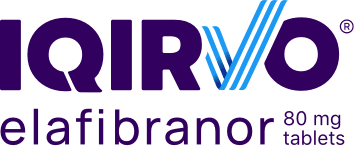Important Safety Information
Myalgia, Myopathy, and Rhabdomyolysis: Rhabdomyolysis resulting in acute kidney injury occurred in one IQIRVO-treated patient who had cirrhosis at baseline and was also taking a stable dose of an HMG-CoA reductase inhibitor (statin). Myalgia or myopathy, with or without CPK elevations, occurred in patients treated with IQIRVO alone or treated concomitantly with a stable dose of an HMG-CoA reductase inhibitor. Assess for myalgia and myopathy prior to IQIRVO initiation. Consider periodic assessment (clinical exam, CPK measurement) during treatment with IQIRVO, especially in those who have signs and symptoms of new onset or worsening of muscle pain or myopathy. Interrupt IQIRVO treatment if there is new onset or worsening of muscle pain, or myopathy, or rhabdomyolysis.
Fractures: Fractures occurred in 6% of IQIRVO-treated patients compared to no placebo-treated patients. Consider the risk of fracture in the care of patients treated with IQIRVO and monitor bone health according to current standards of care.
Adverse Effects on Fetal and Newborn Development: IQIRVO may cause fetal harm when administered during pregnancy. For females of reproductive potential, verify that the patient is not pregnant prior to initiation of therapy. Advise females of reproductive potential to use effective non-hormonal contraceptives or add a barrier method when using systemic hormonal contraceptives during treatment with IQIRVO and for 3 weeks following the last dose of IQIRVO.
Drug-Induced Liver Injury: Drug-induced liver injury occurred in one patient who took IQIRVO 80 mg once daily and two patients who took IQIRVO at 1.5-times the recommended dosage, of which one presented with autoimmune-like hepatitis. The median time to onset of elevation in liver tests was 85 days. Obtain baseline clinical and laboratory assessments at treatment initiation with IQIRVO and monitor thereafter according to routine patient management. Interrupt IQIRVO treatment if liver tests (ALT, AST, total bilirubin [TB], and/or alkaline phosphatase [ALP]) worsen, or the patient develops signs and symptoms consistent with clinical hepatitis (e.g., jaundice, right upper quadrant pain, eosinophilia). Consider permanent discontinuation if liver tests worsen after restarting IQIRVO.
Hypersensitivity Reactions: Hypersensitivity reactions have occurred in a clinical trial with IQIRVO at 1.5-times the recommended dosage. Three patients (0.2%) had rash or unspecified allergic reaction that occurred 2 to 30 days after IQIRVO initiation. Hypersensitivity reactions resolved after discontinuation of IQIRVO and treatment with steroids and/or antihistamines. If a severe hypersensitivity reaction occurs, permanently discontinue IQIRVO. If a mild or moderate hypersensitivity reaction occurs, interrupt IQIRVO and treat promptly. Monitor the patient until signs and symptoms resolve. If a hypersensitivity reaction recurs after IQIRVO rechallenge, then permanently discontinue IQIRVO.
Biliary Obstruction: Avoid use of IQIRVO in patients with complete biliary obstruction. If biliary obstruction is suspected, interrupt IQIRVO and treat as clinically indicated.
Drug-Drug Interactions
IQIRVO may reduce the systemic exposure of progestin and ethinyl estradiol (CYP3A4 substrates), which may lead to contraceptive failure and/or an increase in breakthrough bleeding. Switch to effective non-hormonal contraceptives or add a barrier method when using hormonal contraceptives during treatment with IQIRVO and for at least 3 weeks after last dose.
CPK elevation and/or myalgia occurred in patients on IQIRVO monotherapy. Co-administration of IQIRVO and HMG-CoA reductase inhibitors can increase the risk of myopathy. Monitor for signs and symptoms of muscle injury. Consider periodic assessment (clinical exam, CPK) during treatment. Interrupt IQIRVO treatment if there is new onset or worsening of muscle pain or myopathy.
Co-administration of IQIRVO with rifampin, an inducer of metabolizing enzymes, may reduce the systemic exposure of elafibranor resulting in delayed or suboptimal biochemical response. Monitor the biochemical response (e.g., ALP and bilirubin) when patients initiate rifampin during treatment with IQIRVO.
Bile acid sequestrants may interfere with IQIRVO absorption and systemic exposure, which may reduce efficacy. Administer IQIRVO at least 4 hours before or after a bile acid sequestrant, or at as great an interval as possible.
Use in Special Populations
Pregnancy: Based on data from animal reproduction studies, IQIRVO may cause fetal harm when administered during pregnancy. There are insufficient data from human pregnancies exposed to IQIRVO to allow an assessment of a drug-associated risk of major birth defects, miscarriage, or other adverse maternal or fetal outcomes. Report pregnancies to Ipsen Biopharmaceuticals, Inc. adverse event reporting line at 1-855-463-5127 or .
Lactation: There are no data available on the presence of IQIRVO or its metabolites in human milk, or on effects of the drug on the breastfed infant or the effects on milk production. IQIRVO is not recommended during breastfeeding and for at least 3 weeks following last dose of IQIRVO because the risk to breastfed child cannot be excluded.
Females and Males of Reproductive Potential: IQIRVO may cause fetal harm when administered to pregnant women. Verify the pregnancy status of females of reproductive potential prior to initiating IQIRVO. Advise females of reproductive potential to use effective contraception during treatment with IQIRVO and for 3 weeks after the final dose.
The most common adverse events occurring in ≥10% of patients were weight gain (23%), abdominal pain (11%), nausea (11%), vomiting (11%), and diarrhea (11%).
You are encouraged to report side effects to FDA at 1-800-FDA-1088 or . You may also report side effects to Ipsen Biopharmaceuticals, Inc. at 1-855-463-5127.
Please see full Prescribing Information for IQIRVO.

